"It's Trophy Killing And They're Getting Away With It": Voices From The London Black Lives Matter Protest
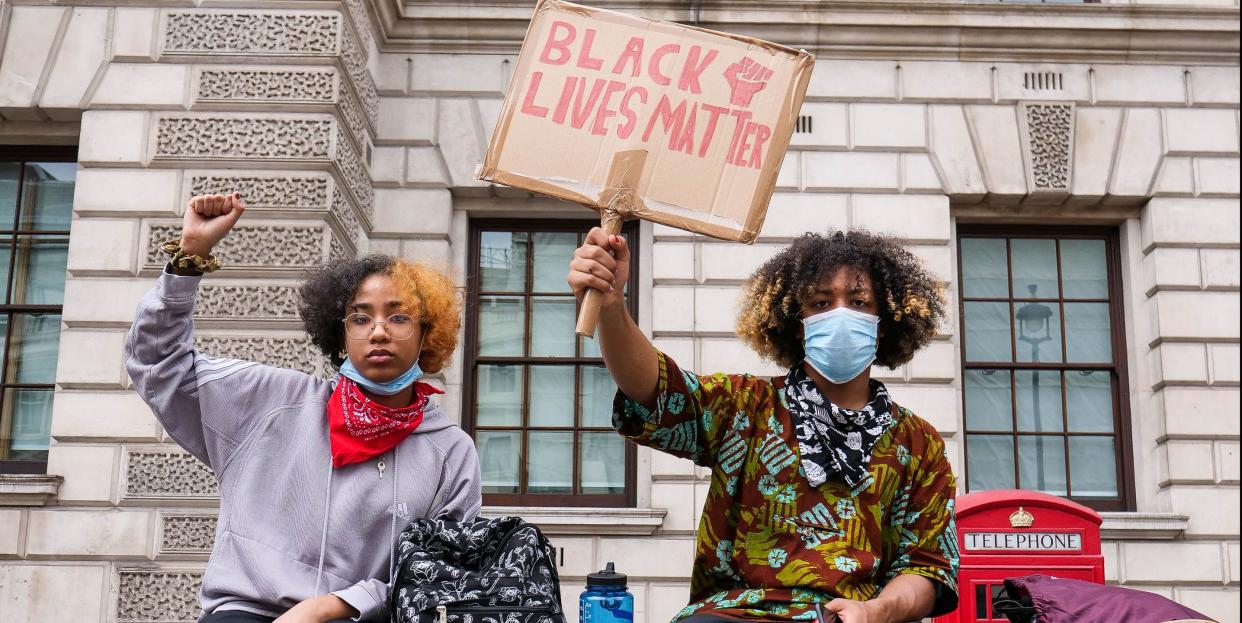
On 25 May, George Floyd, an unarmed 46-year-old black man, died by asphyxiation after Minneapolis police officer Derek Chauvin knelt on his neck for 8 minutes and 46 seconds. Four days later, on the other side of the Atlantic, British Transport Police announced that no further action would be taken in the case of Belly Mujinga, a rail ticket officer who fell ill and died days after being coughed and spat at by a man claiming to have Covid-19.
These were different tragedies in different countries, but each illustrated the systemic racism that still pervades the societies in which they occurred. Floyd's and Mujinga's deaths are visceral illustrations of the ways that Black bodies are marginalised and brutalised, and both deaths have catalysed anger, then action, in the days since.

On Wednesday this week, Black Lives Matter protesters took to the streets of central London, the second event in a week of action that is being held in solidarity with protests in the United States where, since Floyd's murder, demonstrations have been held in all 50 states.
At just before one o'clock, people were streaming out of Marble Arch tube station dressed in red socks, red face masks, red hats and red football shirts; organisers had requested people wear the colour in solidarity. Due to concerns around coronavirus, marshals sat people in groups of five on the grass to observe social distancing. Soon, though, that effort began to seem futile as new arrivals attempted to navigate a swelling crowd, which seemed to have no beginning or end.
Twenty-eight-year-old Syrus, from Harlesden, was watching Hyde Park fill up as he waited for a friend by the railings. Having grown up in a predominantly white area, Syrus later moved to a mixed-race community in London and started to see how the people around him at school, or on the street, were treated differently.
"White people are oblivious to the fact that sometimes they are unintentionally racist," he said. "I’ve got white folks in my friendship group and I’ve taken the time to understand their culture but I think – not everyone, but there’s a large majority of people who are oblivious to black culture.
"Work in general is shit for black people in the UK," he added. "There’s a lot of white people who have open-plan offices and earn big money and you don’t see black people in those jobs. There’s a big difference between the two and that’s one of the main reasons I’m here, because as people we need to all come together and acknowledge it’s a problem."
The protests in America were ignited by yet another viral video of yet another unarmed black man being killed by yet another police officer. George Floyd's death was mentioned everywhere at the march in the UK, but those attending also spoke of the need for people to acknowledge the examples of systemic prejudice they have faced, instead of questioning whether racism exists here.
"I was strip-searched for a crime I didn’t commit and held in a cell for 20 hours," said Mia, a slight 26-year-old who was protesting with her friend Demi, 20. "It was a complete violation of my body and pride. There is prejudice within our police system in the UK and I think racism is rife."
In another group, a young woman called Skye spoke of how her grandfather had come to Britain as part of the Windrush generation. "It’s been really hard for my family," she said quietly. "My mum is black and I see how my family have been oppressed over the years. There’s still racism going on, not just for black people but Hispanic people, Jewish, Muslims. It just needs to stop."
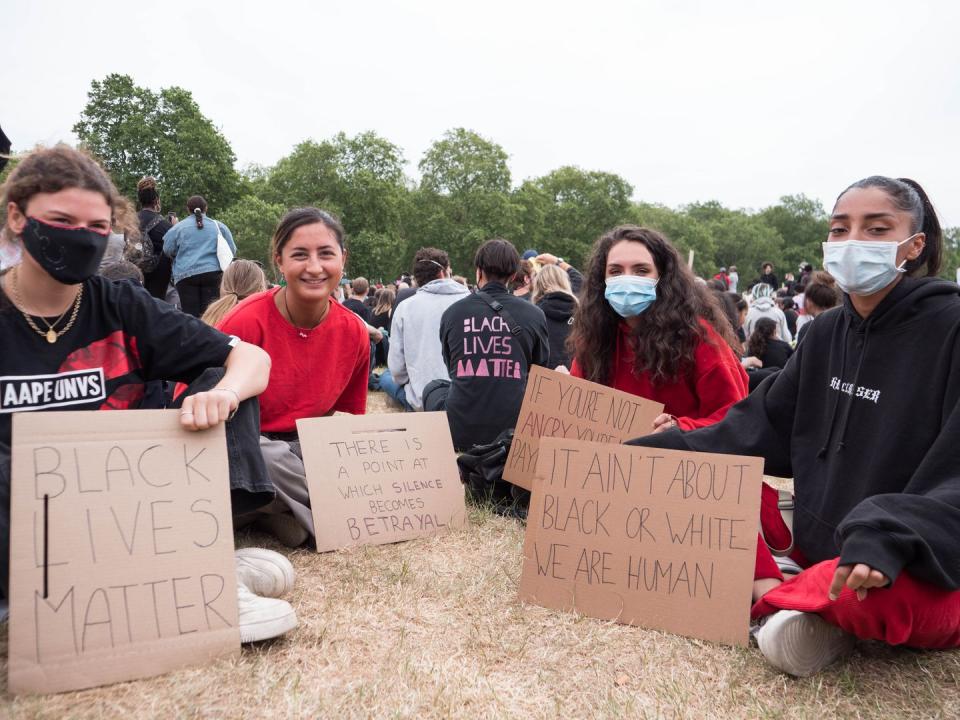
One of her friends, a white girl called Natalia, felt that despite the risk of coronavirus, it was still important to be present. "It’s about amplifying what other people are saying," she said. "So I’ll just sit back and give whatever support I can."
Beyond where their group sat there were cheers as Star Wars actor and Londoner John Boyega addressed the crowd through a megaphone. "Every black person understands and realises the first time you are reminded that you are black," he said, his voice straining. "I need you to understand how painful it is to be reminded every day that your race means nothing. And that isn't the case anymore."
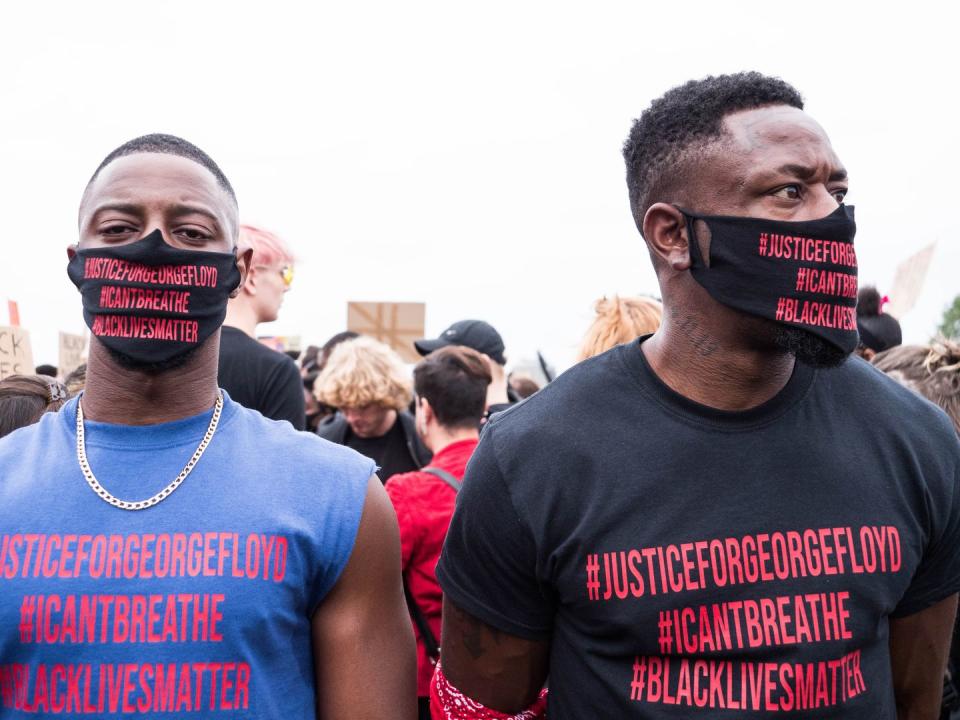
In the throng, Ndan, a 36-year-old from Crystal Palace, talked about being one of the people behind the first London protest a few days earlier. "The last straw for me was seeing George Floyd lose his life while the whole world watched," he said. "Police might be less inclined to kill people here, but there's still racism.”
Ndan, attending with his friend Marvin, talked about the need for white people to speak up when they see something they know isn't right and about his hope that the momentum continues. He was confident that Floyd's death, and the ensuing global protests, represented a watershed moment in the fight against racial injustice. Marvin seemed less sure. "I hope that two weeks later, and two months later, that everyone still has the same energy, but there is still a long way to go."
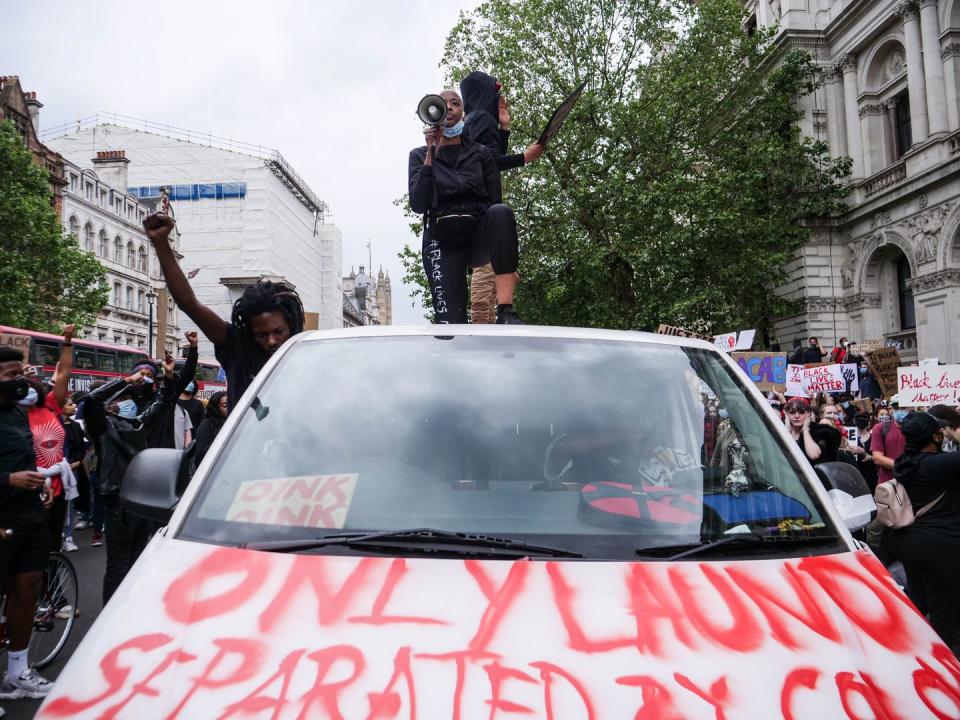
By two o'clock, as rain started to fall from a sky that hung over Hyde Park like a damp sheet, the crowd started to march. It snaked down Park Lane, between stopped traffic and out-of-service buses parked end-to-end. The route was not officially circulated and as the crowd flowed out of the confines of the park it spread through different streets, anywhere it could take up space and make noise; the sound of the crowd was a steady but righteous roar under the rain.
For the older attendees, there was a wariness at seeing the same hope they had seen in the past quickly fade away. Cynthia, a 63-year-old woman here with two friends, spoke with something between exhaustion and rage. "I’m here because I’m upset and angry about the murder of George Floyd," she said. "It gives me nightmares. It’s trophy killing that’s going on and they’re getting away with it. I’ve had enough, I think we’ve all had enough. I pray to God this brings change because it’s time."
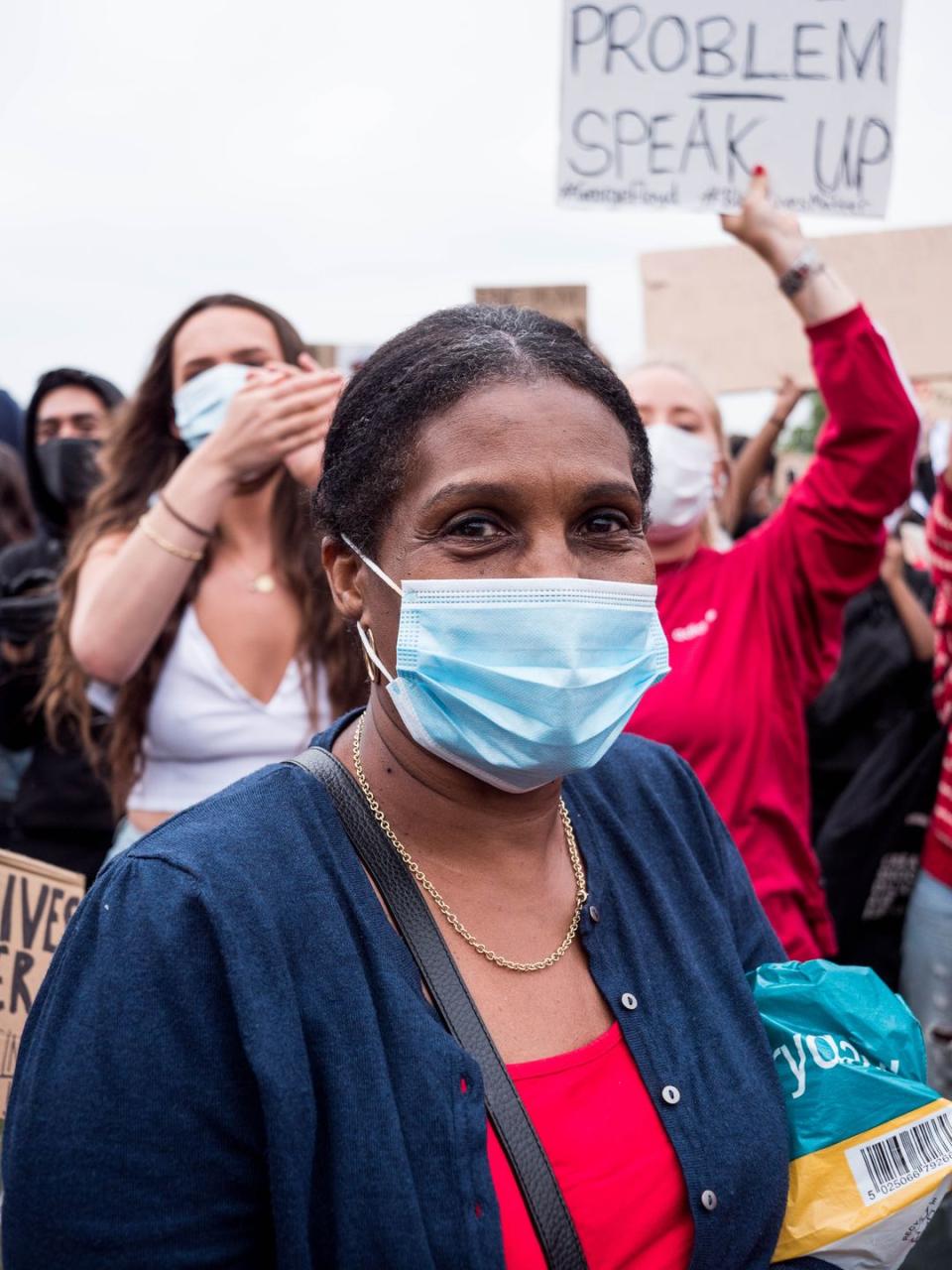
In Parliament Square, a patch of grass in the shadow of Big Ben and the House of Commons, protesters held up signs saying 'The UK is not innocent', waving them toward the building where Boris Johnson had been taking Prime Minster's Questions a few hours earlier. When Johnson was asked about his failure to condemn the actions and rhetoric of President Donald Trump, Johnson replied, brusquely, "Of course black lives matter."
As the crowd dispersed in different directions, some heading toward the US Embassy and others congregating outside Downing Street, Senait, 35, was holding her seven-month-old daughter on her hip while her husband pushed a buggy slightly ahead of her. Senait is from Germany but now lives in London and said she was uplifted by the desire for change around her.
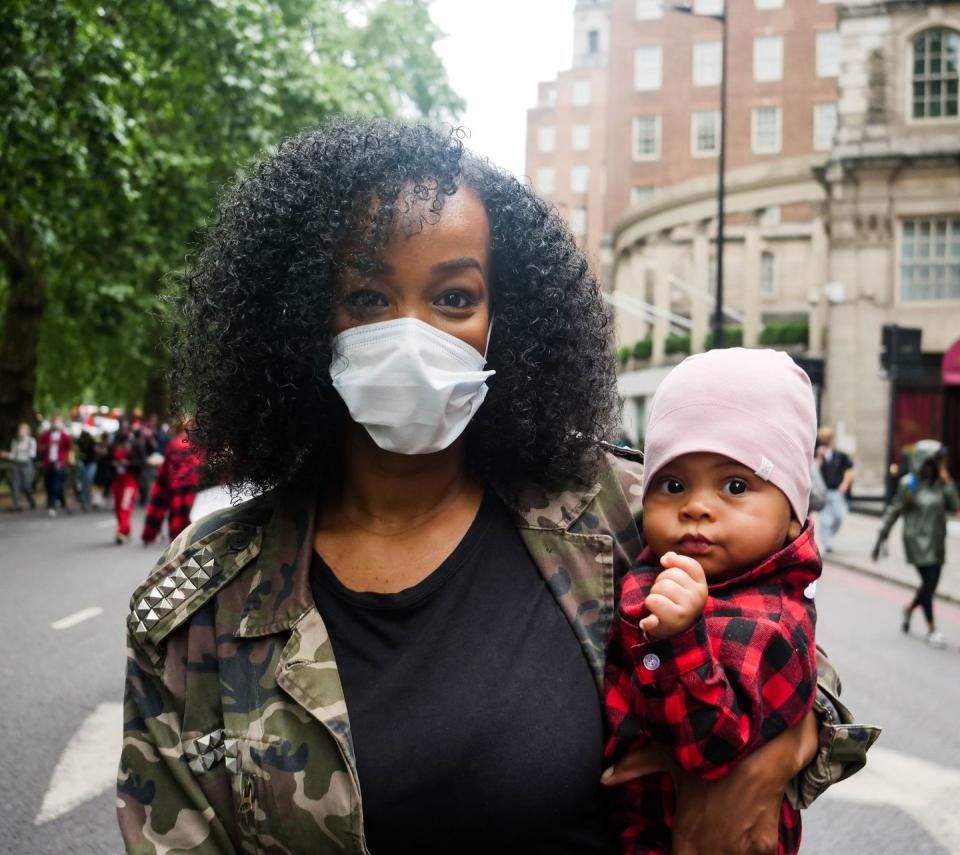
Though the waves of support from on Instagram have been met with mixed reactions – many have suggested sharing helpful information instead of a a silent black square – Senait felt that social media is the reason people are seeing protests and taking to the streets themselves.
"This is my first child," she said of why she had come out today, "and I think my husband and I need to set an example for the way she can grow up. We were speaking the other day about the best way to help and it's about being present. Don’t turn away from this."
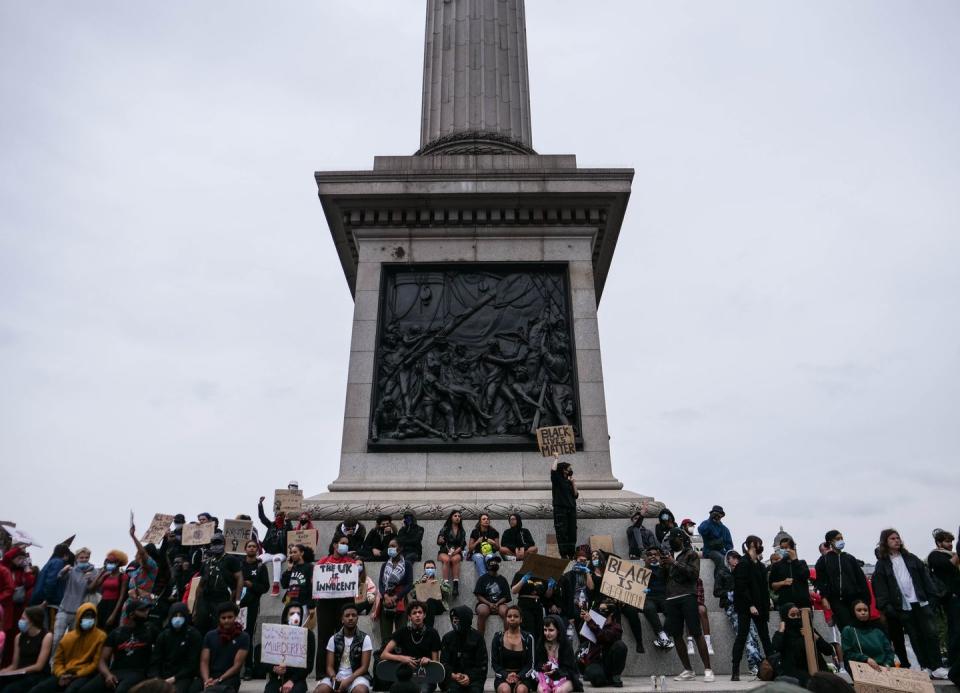
At Trafalgar Square many people had paused in silence on Nelson's Column to hold their signs above their heads. There were some of the same banners which have been at protests for the last five years – 'If you're not angry, you're not paying attention', or 'I don't like this episode of Black Mirror' – but one of the most striking was a reused cardboard box with a phrase written in such narrow biro script that you could have missed it.
It featured a phrase uttered by George Floyd's six-year-old daughter, Gianna, which had been caught on camera the previous day, her words now held toward the sky in a city 4,000 miles away.
"Daddy changed the world."
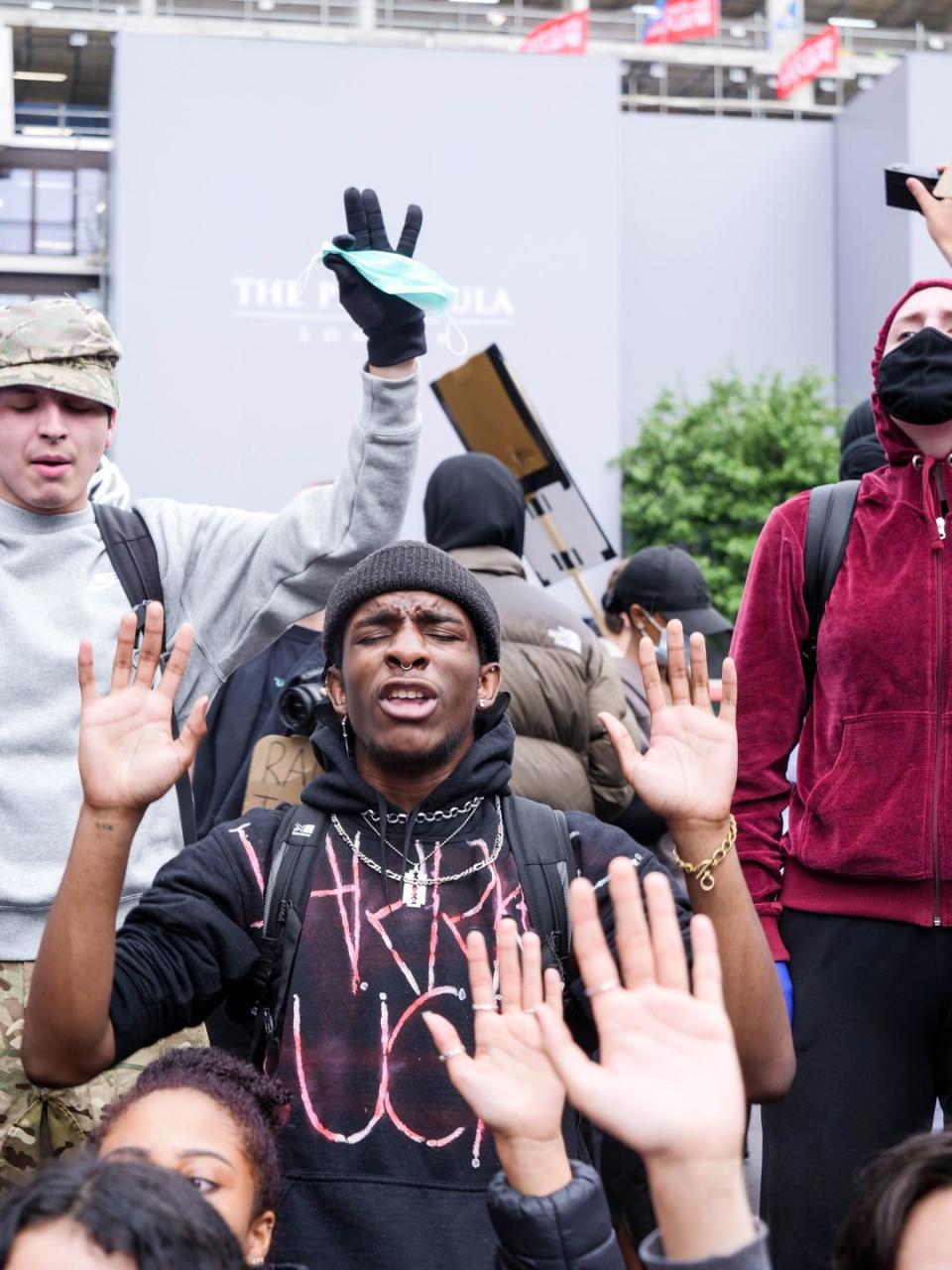
Photos by Kishanth Javegar, a filmmaker and photographer based in London. Follow him on Instagram (@kishanth).
You Might Also Like


